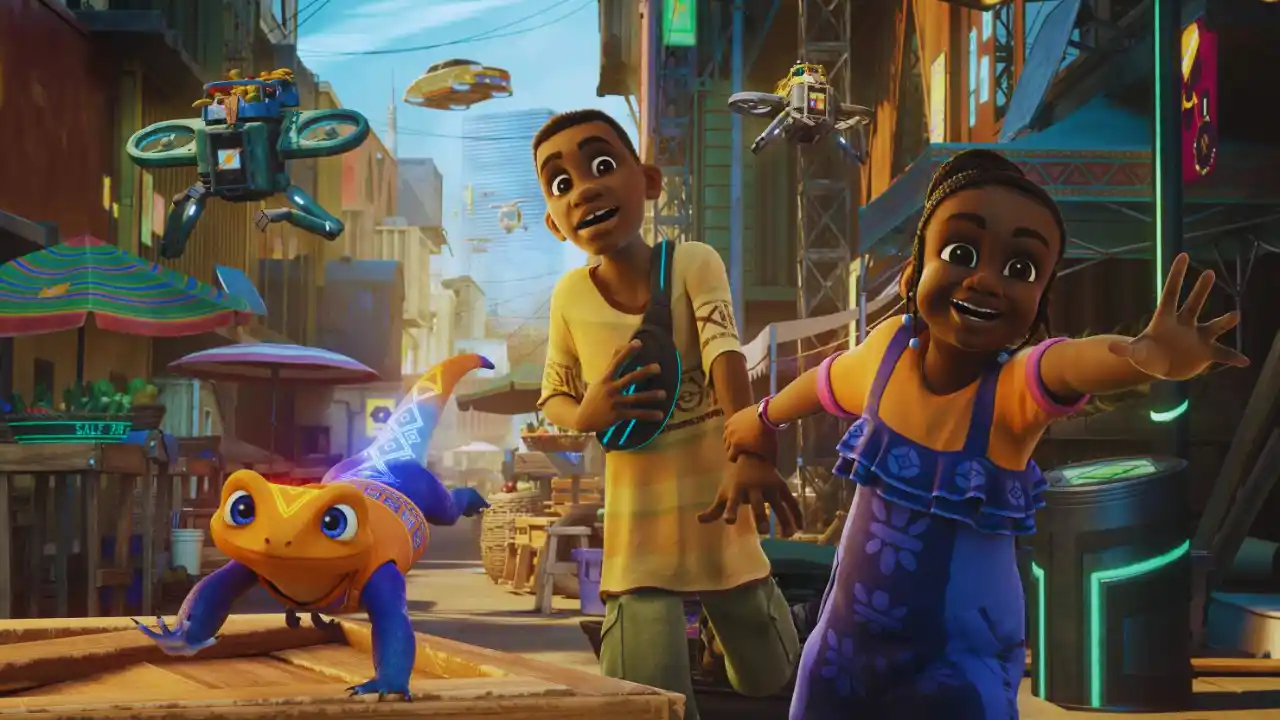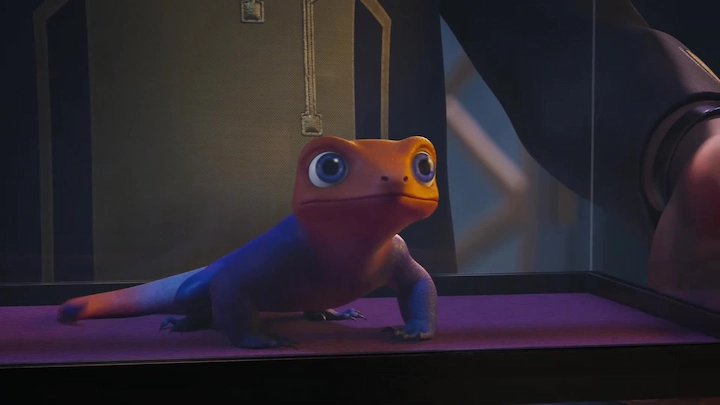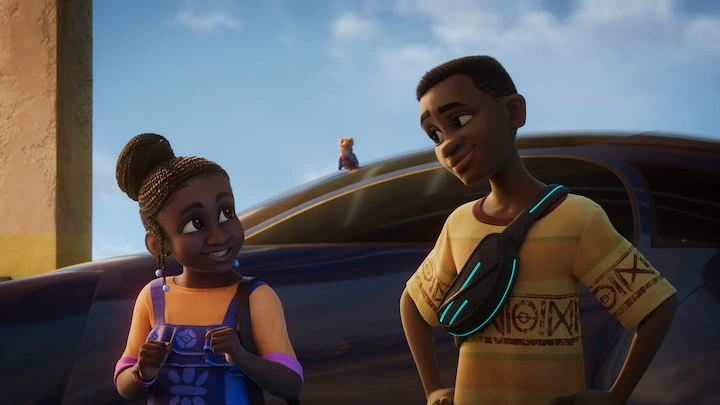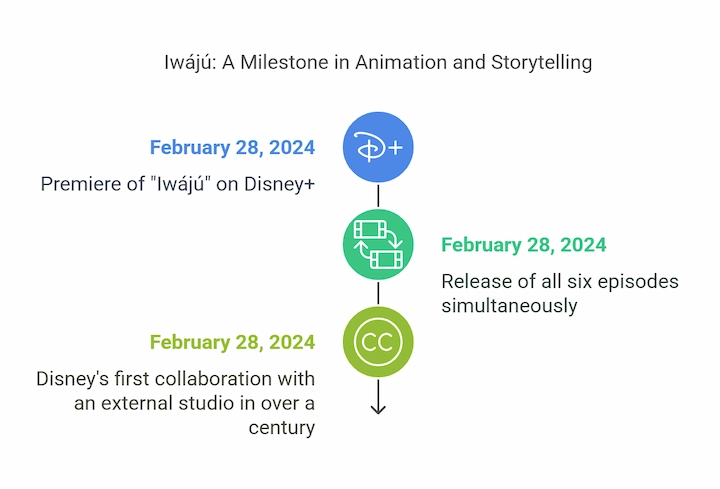The Iwájú Season Release Date, Storyline, and Everything You Need To Know
Iwájú is a new show from Disney that debuted on Disney+ on February 28, 2024. It is a six-episode series depicting a future version of Lagos, Nigeria. Disney made the show in conjunction with Kugali Media. Iwájú tells stories about African people in a new way. It includes wealthy and impoverished sections of Lagos. It also speaks about big things like family and treating everyone fairly.
The Iwájú Season Release Date
All six episodes were dropped at once on February 28, 2024, when Iwájú, a groundbreaking animated series, was released on Disney+. This effective binge-release strategy allowed viewers to immerse themselves in a narrative and offered a more engaging and immersive experience without waiting week by week.
The release was especially noteworthy because it was Disney’s first venture with an outside studio in over 100 years, signaling a broader embrace of diverse storytellers and voices within animation.
The series became a critical hit and was lauded for its original animation style, which brilliantly melds 3D and 2D designs, and its cultural authenticity, drawing heavily on Nigerian traditions and folklore. Critics and theatregoers praised its ability to handle complex characters and themes, positioning “Iwájú” as both an achievement and a mile marker in modern animation.
The Iwájú Season Storyline
Iwájú is set in a future Lagos. Tomorrow, Lagos will boast flying cars and robot lizards. Suya, a tasty Nigerian food, is still sold in the market. Lots of the fundamental aspects of Lagos culture remain in the show. It also shows the city spirit locals call “Eko oni baje.” It means “Lagos no go spoil.”
The show’s creators wanted Lagos to compete on the same level as New York or London. By placing the story here, viewers get to witness actual Nigerian life. The series offers a cheerful vision of what Africa could be. This new Lagos dismantles old notions about Africa. It illustrates how the continent can innovate and spawn new ideas.
It’s a story set in two sides of Lagos. Both sides have dreams and hopes; one is rich, and the other is poor. The show is telling us that your home should not dictate your future. It demonstrates that working hard and helping others is more important than money.
The Iwájú Season Cast Member
Main Cast
| Actor | Character | Description |
| Simisola Gbadamosi | Tola Martins | A 10-year-old girl from affluent Lagos Island, curious and ambitious. |
| Siji Soetan | Kole Adesola | Tola’s best friend from the mainland is a self-taught tech expert. |
| Dayo Okeniyi | Tunde Martins | Tola’s father is a tech executive who is creating robotic protectors. |
| Femi Branch | Bode DeSousa | A complex antagonist operating an underground criminal syndicate. |
| Weruche Opia | Otin | Tola’s robotic pet lizard provides comic relief and growth. |
Additional Cast
| Actor | Character | Notes |
| Toyin Oshinaike | Godspower | Supporting role |
| Bisola Aiyeola | Happiness | Supporting role |
| Sodiq Yusuff | Sunday Adelekan | Supporting role |
Things We All Understand Iwájú Theories
Iwájú is set in Nigeria, but its stories matter to everyone. The show takes the disparity of wealth between its characters. It demonstrates this through the fate of the characters. It also examines what families want out of children. It shows how difficult it can be to deviate from societal norms.”
One unfortunate but true subject matter is human trafficking. This is far too common in Nigeria. By discussing this issue, the show helps raise awareness about it. But it is also hopeful because brave characters stand up against bad things.
Tola’s story demonstrates what it means to grow up. She has to learn to make her parents proud while living her dreams. Kids everywhere get this. The show reminds us that growing up is hard, yes, but also electrifying.
The show’s uniqueness comes from its meshing of African culture and future concepts. It places robots and flying cars alongside Nigerian food and words. It folds these combined elements in a new, engaging way. It shows that stories can bend the past to the future.
Iwájú Season: How It Shows the Future of African Stories
Iwájú is a type of Afrofuturism. It refers to stories that reimagine the future from African perspectives. The series blends science fiction and African traditions. The city views and the Yoruba words pay tribute to African culture. “Iwájú” translates to “the future” in Yoruba.
This readjustment of the lens through which stories are told alters perceptions of Africa. Rather than depicting Africa as impoverished or lacking, it represents Africa as an incubator of new ideas. Partnering with African storymakers like Kugali Media helps Disney ensure the show is authentic to Africans.
The show fantasizes about what Lagos may become years from now. But it does retain the essence of the real Lagos. This combination encourages viewers to reflect on how places can evolve and yet hold on to their quirks. It urges us to reflect on the future we want to construct.
Its bright colors and detailed backgrounds help make the future Lagos country a place you might visit. Its mix of hand-drawn and computer animation encompasses a world that feels alive.
Iwájú Season Episode List
| Episode | Title | Summary |
| Episode 1 | Iwájú | Tola receives a surprising birthday gift from her father, Tunde, setting the stage for her journey in futuristic Lagos. |
| Episode 2 | Bode | Tola and Kole learn more about each other’s lives while Bode plans his subsequent kidnapping. |
| Episode 3 | Kole | Tola enjoys her “best day ever” at the market with Kole, but Bode pressures Kole to make a tough choice. |
| Episode 4 | Tunde | Tunde takes drastic measures to rescue Tola, while Kole tries to protect his mother. |
| Episode 5 | Otin | Kole discovers Otin’s true nature and joins forces with Tunde to save Tola from Bode. |
| Episode 6 | Tola | Bode underestimates Tola as he brings the group back to her home, leading to an unexpected turn of events. |
The African Culture That Iwájú Season Represents
One of the most exciting aspects of Iwájú is its representation of authentic African culture. The characters sometimes converse in Nigerian Pidgin English, making their conversations authentic. The show also illustrates Nigerian morals, such as respect for elders and concern for others in your community.
Spicing its storytelling with fresh depth instead of tired clichés, Iwájú raises the bar high for the representation of cultures in TV programs. It shows that stories from specific places can move folks everywhere when told in honest ways.
The show’s music was by Ré Olunuga. There are African and modern sounds that add emotion to the story. The show’s clothes, food, and buildings glow like they belong in Lagos. These small touches help the world of Iwájú feel genuine.
The show is not afraid of tackling tricky subjects. It addresses the divide between the wealthy and the impoverished in Lagos and illustrates how technology can widen or close this divide. The show respects its viewers’ intelligence by talking about real issues.
How Disney and Kugali Created Iwájú Season
The collaboration between Disney Animation and Kugali Media may be momentous in cartoon history. The collaboration melds various perspectives to shape a narrative that links African stories with global audiences.
Teams from Disney studios in Burbank and Vancouver worked on the show. Cinesite Studios in Montreal and London also assisted. This makes sense, given that creating modern cartoons often requires people from around the world.
The show took years to make. Teams had to teach themselves about Lagos’s culture and create a future iteration of the city. They also had to write characters that readers could care about. All this elbow grease led to a show that looks like no other show on TV.
Its collaboration with Kugali Media showed that big companies could do good with smaller partners. This could result in various types of shows that represent different cultures. It also creates opportunities for storytellers from places that seldom get to tell their stories.

FAQs About Iwájú
Q. What does “Iwájú” mean?
Iwájú means “the future” in Yoruba, a Nigerian language. This name bodes well for the show’s future.
Q. Where can I watch Iwájú?
You can see the show on Disney+. You have one free article left to read.
Q. How many episodes are there?
The first season of Iwájú has six episodes.
Q. Who are the main characters?
The show features its central characters Tola Martins (Simisola Gbadamosi), Kole Adesola (Siji Soetan), Tunde Martins (Dayo Okeniyi), Bode DeSousa (Femi Branch), and Otin (Weruche Opia).
Q. What are some of the big ideas Iwájú tackles?
The show discusses disparities around money, dreams, family, protecting children, and cultural identity.
Q. What makes Iwájú special?
Its blend of African future stories, accurate cultural particulars, and ideas anyone can identify with sets it apart from other cartoon series.
Final Words
Disney’s Iwájú is not just a cartoon show. It’s a celebration of African stories shared with the entire world. Combining futuristic concepts with real-world cultures provides an enticing snapshot of Africa’s future. It also speaks to things that all humans wrestle with.
And Iwájú demonstrates to viewers across the globe that a multitude of voices can create unforgettable stories to share with everyone. It paved the way for more shows that celebrate cultures worldwide. This show may be the first phase of a future in which all stories are told.



